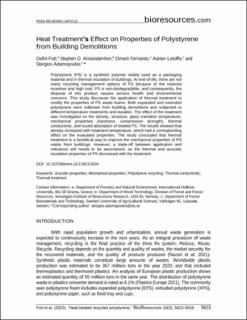Heat Treatment’s Effect on Properties of Polystyrene from Building Demolitions
Peer reviewed, Journal article
Published version
Permanent lenke
https://hdl.handle.net/11250/3108462Utgivelsesdato
2023Metadata
Vis full innførselSamlinger
- Divisjon for skog og utmark [521]
- Publikasjoner fra CRIStin - NIBIO [4575]
- Vitenskapelige artikler [1416]
Sammendrag
Polystyrene (PS) is a synthetic polymer widely used as a packaging material and in thermal insulation of buildings. At end-of-life, there are not many recycling management options of PS because of the reduced incentive and high cost. PS is non-biodegradable, and consequently, the disposal of this product causes serious health and environmental concerns. This study discusses the application of thermal treatment to modify the properties of PS waste foams. Both expanded and extended polystyrene were collected from building demolitions and subjected to different temperature treatments and duration. The effect of the treatment was investigated on the density, structure, glass transition temperature, mechanical properties (hardness, compression strength), thermal conductivity, and sound absorption of treated PS. The results showed that density increased with treatment temperature, which had a corresponding effect on the evaluated properties. The study concluded that thermal treatment is a beneficial way to improve the mechanical properties of PS waste from buildings. However, a trade-off between application and relevance still needs to be ascertained, as the thermal and acoustic insulation properties of PS decreased with the treatment.
